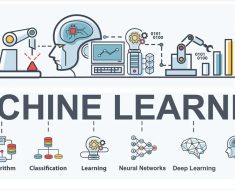
In the realm of artificial intelligence (AI), there exists a concept that transcends the boundaries of narrow tasks and specialised algorithms. It’s a pursuit that aims to replicate not just specific skills or functions but the comprehensive cognitive abilities of the human mind. This concept is known as Artificial General Intelligence (AGI), and it represents the pinnacle of AI research – the creation of a machine that can truly think and learn like a human.
UNDERSTANDING ARTIFICIAL GENERAL INTELLIGENCE:
At its core, AGI seeks to develop machines that possess the ability to understand, learn, and adapt across a wide range of tasks and domains, much like humans do. Unlike narrow AI, which excels at specific tasks such as image recognition or language translation, AGI aims for a level of versatility and adaptability that mirrors human intelligence.
KEY CHARACTERISTICS OF AGI:
Adaptability: AGI systems are designed to learn from their experiences and adapt to new situations, tasks, and environments without the need for explicit programming.
Generalisation: AGI is capable of transferring knowledge and skills across different domains, allowing it to apply learning from one task to solve unrelated problems.
Reasoning and Understanding: AGI exhibits higher-order cognitive abilities, including logical reasoning, comprehension of complex concepts, and abstract thinking.
Creativity: AGI has the potential to generate novel ideas, solutions, and creative outputs by synthesising existing knowledge and exploring new possibilities.
Self-awareness: While still a speculative aspect, some envision AGI possessing a level of self-awareness and consciousness, enabling introspection and reflection on its own existence and goals.
CHALLENGES AND CONSIDERATIONS:
Complexity: Replicating the complexity and nuance of human intelligence in a machine is a daunting task that requires breakthroughs in various fields, including neuroscience, computer science, and cognitive psychology.
Ethical Implications: The development of AGI raises ethical concerns regarding its impact on society, employment, privacy, and autonomy. Ensuring that AGI aligns with human values and serves the collective good is paramount.
Safety and Control: AGI systems must be designed with robust safety mechanisms to prevent unintended consequences or malicious use. Ensuring human oversight and control over AGI’s actions is crucial for its responsible deployment.
Bias and Fairness: AGI algorithms are susceptible to biases present in the data they are trained on, potentially perpetuating societal inequalities and injustices. Addressing bias and promoting fairness in AGI systems is essential for equitable outcomes.
THE FUTURE OF AGI:
While the realisation of AGI remains a distant goal, the pursuit of this grand challenge continues to drive innovation and exploration in AI research. As scientists, engineers, and ethicists collaborate to overcome technical barriers and address societal concerns, AGI holds the promise of revolutionising industries, advancing scientific discovery, and transforming the way we interact with technology.
![[2402.01207v2] Efficient Causal Graph Discovery Using Large Language Models [2402.01207v2] Efficient Causal Graph Discovery Using Large Language Models](https://aigumbo.com/wp-content/uploads/2023/12/arxiv-logo-fb-235x190.png)




